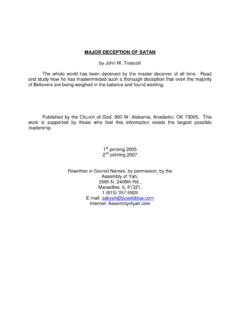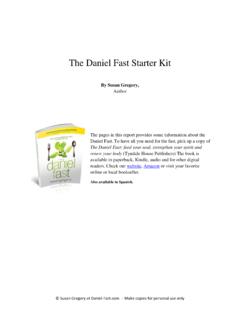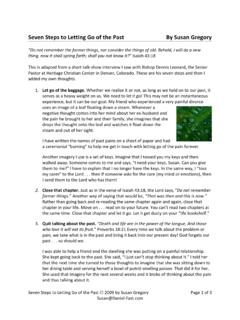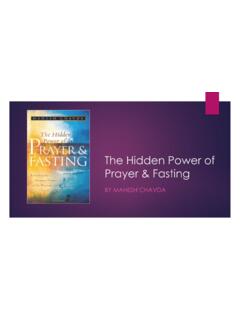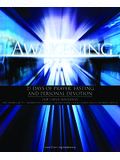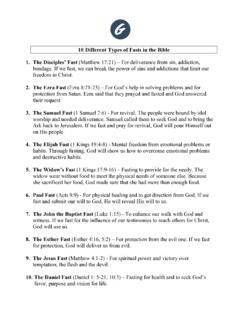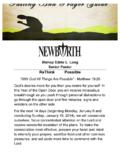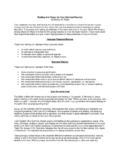Transcription of Afflict Our Souls`MOD - Assembly of Yah
1 What Does It Mean To " Afflict OUR SOULS?" [Leviticus 23:27-32] By Frank Brown Search the Scriptures Ministry P O. Box 32 Clarksville, AR 72830 1 [479] 754-2553 Reprinted by: Assembly of Yah 2695 N. 24091 Rd. Marseilles, IL 61341 1 [815] 357-9926 E-mail: Internet: 2 WHAT DOES IT MEAN TO " Afflict OUR SOULS"? by Frank Brown In Leviticus 16:29-31, we are told about a day called the "Day of Atonement", and are commanded to " Afflict our souls" on that day. Leviticus 16:29, "And [this] shall be a statue for ever unto you: [that] in the seventh month, on the tenth [day] of the month, ye shall Afflict your souls, and do no work at all, [whether it be] one of your own country, or a stranger that sojourns among you.
2 " Leviticus 16:30, "For on that day shall [the priest] make an atonement for you, to cleanse you, [that] ye may be clean from all your sins before YAHWEH." Leviticus 16:31, "It [shall be] a Sabbath of rest unto you, and ye shall Afflict your souls, by a statute for ever." This refers to one of Yahweh's annual Set-apart Days, called the Day of Atonement. In the 23'd chapter of Leviticus, there is a list of ALL of Yahweh's Set-apart Days. He starts with the weekly Sabbath and then enumerates each of the annual festivals for the entire year. In verses 27 through 32, we find reference to this same `Day of Atonement" spoken of in Chapter 16, and again are admonished to " Afflict our souls" on this day.
3 We are also told WHEN to do this: "..in the seventh month, on the tenth day of the month, ye shall Afflict your souls, and do not work at " Verse 32 pinpoints the exact time: "..in the ninth day of the month at even, from even unto even, shall ye celebrate your Sabbath." The "seventh month" refers, of course, to the seventh month of the sacred calendar, which was revealed to Moses in Exodus 12:2, and which corresponds on the Gregorian calendar, that is in common use by the world today, to approximately mid-September to around mid-October. Its Hebrew name is "Tishri." As we shall presently see, this annual Sabbath is just as binding upon True Believers today, as it was on the Israelites back then.
4 It is the only one where we are commanded to " Afflict ourselves" and is considered to be the most solemn occasion of the entire year. Yahweh issues a very stem warning in verse 29: "For whatsoever soul it be that shall not be afflicted in that same day, he shall be cut off from among his people." It follows then that, if we expect to be one of Yahweh's people, we MUST 3 Afflict our souls on this day, as He, in His infinite wisdom, has commanded us to do. But, since these two passages of scripture do not elaborate, we must look elsewhere in His Kodesh Word to find the meaning of this term. The Bible is not to be interpreted privately (II Peter 1:20).
5 We must let the Bible interpret itself. The English word "soul," used here, is translated from the Hebrew "nephesh" and simply means physical life, breath, or body. The same word is used elsewhere in reference to animals. It is not in any way referring to an "immortal soul" or a spirit within man, but rather to the physical body, the life. The word translated " Afflict " is #6031 in Strong s Hebrew Dictionary, and is "ANAH," pronounced "aw-naw". It means to depress, to abase the self, to Afflict , chasten self, deal hardly with, defile, humble, hurt, submit self, weaken. Now let's look at a few scriptures to see how Yahweh's people afflicted and humbled themselves, keeping in mind II Timothy 3:16: "ALL SCRIPTURE IS GIVEN BY INSPIRATION OF YAHWEH, and is profitable for doctrine, for reproof, for correction, for instruction in righteousness:" In 11 Samuel 1:12, we see that David (whose salvation and resurrection is assured, Jeremiah 30:9), and all the men with him, "mourned and wept and ", for Saul, Jonathan, and others who had been killed in battle.
6 In Psalm 35:13, David said, "I humbled (ANAH) my soul with fasting." This same word is used in Daniel 10:12, but is translated "chasten." In verses 2 and 3 of this chapter, we see that Daniel fasted for three weeks, and Yahweh sent an angel to reveal to him what was to happen to His people (v. 14) then in verse 12, the angel tells Daniel that from the first day of his fasting and praying, he was heard. "Then said he unto me, Fear not, Daniel; for from the first day that thou didst set thine heart to understand, and TO CHASTEN THYSELF (ANAH) before thy Elohim, thy words were heard, and I am come for thy words." When Ezra was preparing to lead a group of Jewish exiles from Babylon back to Jerusalem, he called a fast to seek Yahweh's protection during the trip, which would be through rugged, bandit-infested country.
7 4 "Then I proclaimed a fast there, at the river of Ahava, that we might Afflict (ANAH) ourselves before our Elohim." (Ezra 8:21). Psalm 69:10, "When I wept, and chastened (ANAH) my soul with fasting, that was to my reproach." Isaiah 58:3, "Wherefore have we fasted, say they, and thou seest not? Wherefore have we afflicted (ANAH) our soul, and thou takest no knowledge? Behold, in the day of your fast ye find pleasure, and exact all your labours." Joel 2:12, "Therefore also now, saith Yahweh, turn ye even to me with all your heart, and with fasting, and with weeping, and with mourning." Psalm 109:24, "My knees are weak through fasting; and my flesh faileth of fatness.
8 " I Kings 21:27-29, "And it came to pass, when Ahab heard those words, that he rent his clothes, and put sackcloth upon his flesh, and fasted, and lay in sackcloth, and went softly. And the word of Yahweh came to Elijah the Tishbite, saying, Seest thou how Ahab humbleth (ANAH) himself before me? Because he humbleth himself before me, I will not bring the evil in his days: but in his son's days will I bring the evil upon his house." Notice particularly here in I Kings, YAHWEH HIMSELF accepts fasting as an acceptable way to Afflict , or humble oneself before Him. Nehemiah 1:4, "And it came to pass, when I heard these words, that I sat down and wept, and mourned certain days, and fasted, and prayed before the Elohim of heaven.
9 " All these scriptures, as well as others, show plainly that these people FASTED to Afflict , humble, and chastise themselves before Yahweh. But just what IS a fast? Exactly what are we to do? Here again, as always, we should look to the Scriptures for the answer. Deuteronomy 9:9 and 18 show the example Moses left. He says that during his fasts, "I neither did eat bread nor drink water." 5 Queen Esther asked all the Jews in Shushan to join her in a three day fast, "..neither EAT NOR DRINK three days, night or day." (Esther 4:16) Ezra "..did eat no bread, nor drink water." (10:6) We find that the Apostle Paul, in the book of Acts, fasted for three days, neither eating nor drinking.
10 Acts 9:9, "And he was three days without sight, and neither did eat nor drink." So the plain, revealed truth, directly from the Bible, is that we " Afflict our souls" by fasting, and that fasting is the total abstinence from both food and drink. Therefore, on the Day of Atonement, we Afflict our souls by abstaining from food and drink for the 24-hour period from sundown, ending the ninth day, until after sundown of the tenth day, of the seventh Scriptural month (Tishri 10, on the Hebrew calendar). But Leviticus 23 refers to these days as Feasts of Yahweh. Should we FAST on a FEAST day? The Hebrew word translated Feasts in Leviticus 23, is MOWED, OR MOWADAH (Strongs #4150), meaning a fixed season, an appointment, appointed time, or festival.
